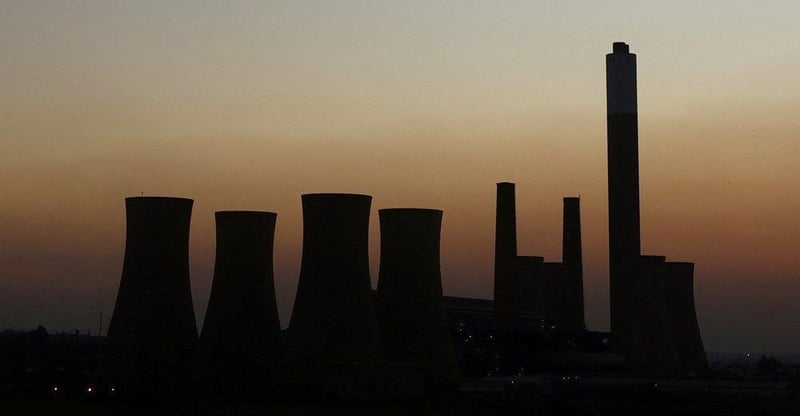South Africa Grants Eskom Coal Plants Limited Emissions Exemptions
Written by: BizCommunity Editor Save to Instapaper
The retired coal-fired Komati Power Station, operated by Eskom, is seen near Komati village, in the Mpumalanga province in South Africa, 9 May 2024. Reuters/Siphiwe Sibeko/File Photo
The government is struggling to strike a balance between calls to reduce its carbon footprint and stop harmful emissions and the need to provide electricity to Africa's most advanced economy, which has stagnated due to power cuts.
Power utility Eskom, whose fleet of old coal-fired power plants generates most of South Africa's electricity, had applied to exempt eight of its plants from minimum emission standards prescribed in air quality regulations.
In granting the exemptions, the Ministry of Forestry, Fisheries and Environment (DFFE) said it would require Eskom to step up monitoring, appoint environmental health specialists and provide mobile health clinics, among other measures.
"These exemptions are not a blanket reprieve but are tailored to each facility with stringent conditions," environment minister Dion George told a press conference.
Six of the plants - Lethabo, Kendal, Tutuka, Majuba, Matimba and Medupi - will have exemptions capped at five years, expiring on 1 April 2030, while the Duvha and Matla power stations will be exempted until their planned decommissioning dates in 2034.
Eskom said it was reviewing Monday's decision and was committed to reducing negative societal impacts on health and the environment.
The utility, one of the continent's worst polluters, has been running its plants hard in an attempt to end a decade of economically devastating power cuts and clear a maintenance backlog amid regular breakdowns.
It has previously said that retrofitting its plants, many of them 30 to 40-years-old, with new technology to reduce harmful emissions is too costly.
Early this month a 10-year study found that people living near coal-fired power stations, mostly concentrated in Mpumalanga province's coal belt, had a mortality rate 6% higher than their peers elsewhere in South Africa.
The report from the South African Medical Research Council and Britain's Department for International Development found higher rates of birth defects and cardiovascular and lung disease in communities near plants. It recommended phasing out the coal-fired plants.
"We want enough electricity to grow our economy, and we want clean, breathable air," George said. "It is completely unacceptable when our children have problems with their lungs, and babies are born with cleft palates."
We submit and automate press releases distribution for a range of clients. Our platform brings in automation to 5 social media platforms with engaging hashtags. Our new platform The Pulse, allows premium PR Agencies to have access to our newsletter subscribers.
Latest from
- Pretoria High Court Blocks B-BBEE Requirements For Air Service Licensing In Landmark Ruling
- Kenya Airways Updates Amsterdam Route With Paris Stop On Select Flights
- Presidency Reaffirms Adherence To Finance Laws In National Dialogue Budgeting
- President Updated On Preparations And Challenges For National Dialogue National Convention
- NRF Praised By Minister Nzimande For Advancing Transformation And Delivering High Impact Research
- 2025 Women In Science Awards Reveal Finalists Driving Change And Inspiring The Next Generation
- Entry Deadline Extended For Prism Awards Highlighting The Human Factor In Powerful Communications
- Rainbow Celebrates Women QA Leaders Committed To Nourishing The Nation Safely
- AI Poised To Revolutionise South Africa’s Approach To Workplace Injury And Earnings Assessments
- Khayelitsha Clinic Increases Sterilisation Drive To Reduce Pet Overpopulation And Disease
- South African Central Bank Assesses Minimal Impact From US Tariffs On Trade And Jobs
- Ammat Global Resources Drives Congo Oil Growth With Bold Targets At African Energy Week
- FAO Reports 1.6 Percent Monthly Increase In Food Price Index Led By Vegetable Oils
- Business Partners Highlights Urgent Need To Bridge Gender Finance Gap In Entrepreneurship
- Mustadafin Foundation Champions Young Single Mothers Through Empowerment Initiatives
The Pulse Latest Articles
- Reimagine Your Daily Ritual: Meet The Shower That Does More Than Just Cleanse (August 4, 2025)
- Xlink: An Avant-garde, Purpose-driven Fintelco Driving Digital And Payments Interoperability On The African Continent (August 1, 2025)
- Success Is Just The Beginning For This South African Brand (July 31, 2025)
- Embassies Business Fair And Conference 2025 To Fast-track Africa’s Global Economic Integration (July 31, 2025)
- There Is A Small Business Funding Readiness Crisis In South Africa (July 30, 2025)
